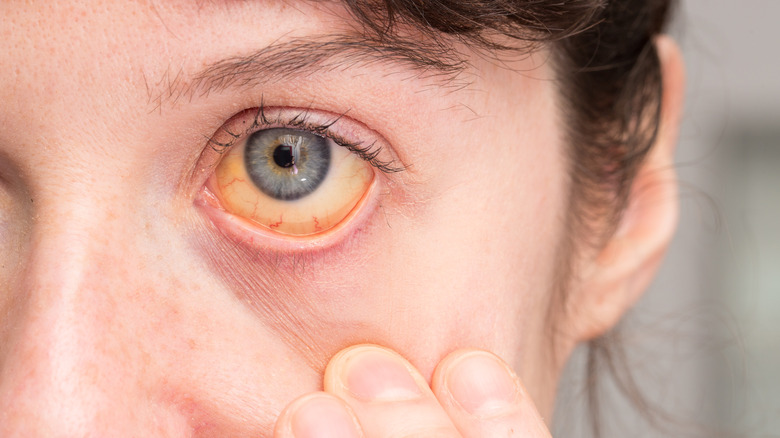What Does It Mean When The Whites Of Your Eyes Are Yellow?
Anything eye-related is a serious matter. After all, having optimal vision is very important. Experts can determine health conditions through examining the eyes, and sometimes, one can see the changes by looking into a mirror. Alarming changes in the eyes may signal different kinds of diseases. With that said, taking care of your health should remain a priority. Bulging eyes, for example, can reveal whether a person has an overactive thyroid (via NHS). Meanwhile, cataracts cause cloudy eyes — a condition that can obstruct vision quality. If an individual has high triglycerides and cholesterol, that person may have a gray ring around the edge of the cornea. And don't think droopy eyelids are normal. Sometimes, it can mean that the person has an autoimmune disease or myasthenia gravis (muscle weakness). It is best to consult with your doctor if you see any changes in your eyes (via CBS News). After all, health is wealth.
Experts can also find signs of the Human Immunodeficiency Virus (HIV) by checking the retina. The disease targets the cells in the immune system, which means people with HIV/AIDS have low immunity to many kinds of illnesses. All parts of their body can be affected, including the eyes. According to the American Academy of Ophthalmology, "people with HIV who are otherwise in good health are not likely to have eye problems related to a suppressed immune system." However, a percentage of AIDS patients with advanced cases "experience eye disorders."
Jaundice can make the whites of your eyes yellow
Jaundice can make the whites of your eyes turn yellow (via All About Vision). Adults often do not need treatment for the condition, but infants do. What needs the utmost attention is any underlying condition, as it could be life-threatening if left untreated. The skin can also appear yellowish when suffering from jaundice. High levels of bilirubin — a yellow substance in the blood — are often the cause of jaundice, as well as malaria, acute pancreatitis, and sickle cell anemia.
The yellow hue of the eyeballs may indicate other health problems, such as liver and gallbladder damage. Jaundice can signal liver dysfunction in a person, including cirrhosis — the late stage of fibrosis (liver scarring). A person suffering from end-stage liver disease has an organ that can no longer do a great job of filtering bilirubin. Longtime alcoholics can also experience yellowing of the eyes, as excessive drinking causes liver damage, per Mayo Clinic. A damaged liver also affects the gallbladder. The organ produces bile, which goes to the gallbladder. If gallstones, cysts, or tumors block the small hollow organ, a build-up of bilirubin can happen, which then causes yellow eyes. Apart from jaundice, an individual may experience fever, chills, weight loss, and abdominal pain. Yellow eyes can signal health problems prior to experiencing other symptoms associated with each disease. When your eyes look odd, it is vital to book an appointment with your doctor to get checked.

